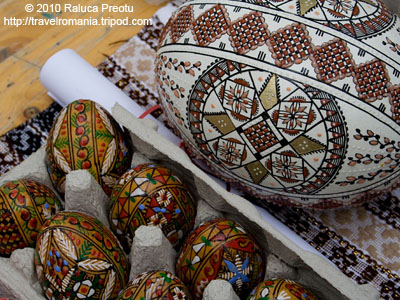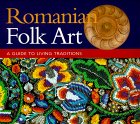 |
 |
 |
 |
 |
 |
 |
 |
 |
 |
 |
 |
Dragobete Fair at the Village Museum in Bucharest
February 22, 2009
|
 |
 |
 |
 |
 |
 |
 |
 |
 |
 |
 |
 |
 |
 |
 |
 |
 |
 |
 |
 |
 |
 |
 |
 |
 |
 |
 |
 |
 |
 |
 |
 |
 |
 |
 |
 |
 |
 |
 |
 |
 |
 |
 |
 |
 |
 |
 |
 |
Click on the image for larger photo
About this photo: Decorated eggs such as these were traditionally created for Easter. Nowadays, red-dyed eggs, symbolizing the blood of Christ, are
far more common in people's homes (also widespread is the use of other colors), and decorated eggs are made year-round and sold at various crafts fairs (as well as crafts shops).
Note the stylized crosses and the vegetal motifs.
|
 |
 |
 |
 |
 |
 |
 |
 Romanian Folk Art: A Guide to Living Traditions
Romanian Folk Art: A Guide to Living Traditions
By Karsten D. McNulty. Aid to Artisans, 2000.
This book offers pictures of Romanian crafts and artisans, as well as of everyday life in Romania,
which the author accompanies with brief descriptions of the techniques as well as info on the artisans.
Karsten D. McNulty spent two years in Romania as a Peace Corps volunteer. She learned the language and then traveled the country to learn about Romanian crafts.
|
 |
 |
 |
 |
 |
 |
 |
February 24 is the day of Dragobete, the traditional Romanian version of Valentine's Day. In the past few years,
the Village Museum and other venues have tried to revive this tradition, vibrant in the 19th century and dating back to the Middle Ages,
when it was superimposed on a Christian Orthodox holiday, The Finding of the Head of Saint John the Baptist.
Pictured in this slide show is the celebration of the day of Dragobete with crafts, music, and dance at the Village Museum in Bucharest on the Sunday of February 22, 2009.
The mythical figure Dragobete is a protector of love akin to Cupid or Eros.
He is also a protector of the birds, and further symbolizes the reawakening of nature and its fecundity.
It is believed that on the day of Dragobete all birds and animals mated. Girls and lads met at the local church and went to meadows and forests to pick spring flowers.
They also built and sat around fires together.
On their return to the village at noontime, each young lad chased and kissed the girl he wanted to become engaged to for at least a year.
No one was supposed to work, hunt, or sacrifice animals on the day of Dragobete.
Instead, young people were meant to "joke around" among themselves in order to stay in love the whole year. Men were advised not to argue with their woman, and women
were encouraged to touch a man from a different village in order to stay attractive to men. The girl that didn't meet a young man on the day of Dragobete
was doomed to stay unloved the whole year through.
Thank you for being here. If you'd like to stay posted of new pictures and news,
send me an email with "subscribe" in the subject line. |
 |
 |
 |
 |
List of All Slide Shows
(Romania: What's Happening,
Romania: Where to Go, and
RECIPES WITH PICS)
More Pictures and Videos of Romania
Webshots user ykarelic4 has posted hundreds of splendid photos of Romania. They are grouped in several Romania albums:
Painted Monasteries of Bucovina I,
Painted Monasteries of Bucovina II,
Romanian Countryside,
Churches and Monasteries I,
Churches and Monasteries II,
Churches and Monasteries III,
Peles Castle,
A Stroll in Brasov,
Bran Castle,
Risnov (Rasnov) Fortress, and
Old City of Sighisoara. Added: February 21, 2010.
Discover Bucharest, Romania
An 11 min 34 sec movie clip about the capital of Romania, produced by TVR for the Romanian Tourist Office.
The camera moves from one famous building to the next, taking you on a quick tour of museums, inns and cafes, churches, and hotels. You
can armchair visit the National History Museum, the National Art Museum, as well as get a sense of some of the architectural styles
you will see in this city. Added: February 14, 2006.
More sites
|
 |
 |
 |

|
 |
 |










